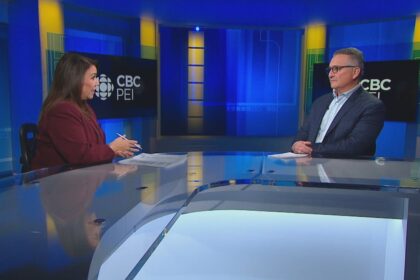Is Canada’s temporary foreign worker program broken?One of the few things Canada’s politicians agree on is that the country’s temporary foreign worker program needs to change. For The National, CBC’s Paula Duhatschek breaks down how the program works, why there are calls for reform and what can be done to fix it. The temporary foreign worker program is once again in the headlines after Conservative Leader Pierre Poilievre called for it to be eliminated, blaming foreign workers for a recent rise in youth unemployment, which hovered around 14.5 per cent over the summer. Some economists caution against drawing a direct line between the program and difficulties that young Canadians face in finding work. But that’s not to say the temporary foreign worker program doesn’t have other potential drawbacks. For years, experts have raised concerns about the program — which allows businesses to hire foreign workers when they can show Canadian citizens or permanent residents aren’t available to take a job — and the degree to which some employers have come to rely on it.According to data from the federal government, 238,157 temporary foreign worker jobs were approved in Canada in 2024. That’s roughly the same number as the year before, but up significantly from 108,988 in 2018, before the pandemic. Some new limits on the program were introduced last fall. Here’s a look at some of the concerns related to the program — and what experts say could be some potential solutions. Problem 1: Lower wages, less innovation?Businesses are required to pay temporary foreign workers a similar wage to their Canadian counterparts. But some economists dislike the program — particularly the low-wage stream — because they say it can dampen wage growth and discourage innovation in the long run. (The program includes multiple “streams,” such as the seasonal agriculture stream, low-wage stream and high-wage stream.)Without the temporary foreign worker program, economists say a business struggling to find workers would either have to raise wages to attract applicants or use new kinds of technology to reduce the number of people it needed.The temporary foreign worker program, they say, gives employers another option. Employers can hire a person from outside Canada who is more willing to work for their advertised wage, so there’s no need to offer more money. “Not only does it potentially hold the wage fixed, it could lead to less investments in new technology,” said Christopher Worswick, an economist at Carleton University in Ottawa. Businesses and industry groups object to this characterization, arguing if the program is shut down, there would be closures, job losses and higher consumer prices, especially in rural and remote locations.Osborne Burke of Victoria Co-operative Fisheries says ending the temporary foreign worker program would hurt the economic contribution of Atlantic Canada. (David Laughlin/CBC)Osborne Burke, general manager of the Victoria Co-operative Fisheries in Neils Harbour, N.S., said in his community there are simply not enough local people to employ. His co-op has been “continually” raising its starting wages for years, he said, but it hasn’t made a difference. “I cannot hire people that do not exist,” said Burke.Problem 2: Power imbalanceBecause temporary foreign workers’ permits are linked to one employer, there’s a power imbalance baked into the program, said Jason Foster, a professor of human resources and labour relations at Athabasca University. At best, he said, workers need to tread carefully to avoid losing their jobs and getting kicked out of the country. At worst, he said, workers are openly taken advantage of.”Your employer holds all the cards in terms of your destiny in this country,” said Lisa Jane de Gara, a settlement worker with Action for Healthy Communities, which helps newcomers in rural Alberta. De Gara said many of the temporary foreign workers who come to her organization for support have paid tens of thousands of dollars to immigration brokers or consultants to secure their jobs. Others report that their bosses pay them a certain wage on paper, then ask for a large chunk of it to be paid back under the table. “I think it is a program that has done a monumental amount of harm,” she said. Kelly Higginson, CEO of Restaurants Canada, noted that federal protections do exist to support workers who have been abused, but that the vast majority of business owners in her sector follow the rules. “If there are bad actors out there, they have no place in our industry,” she said. Some businesses also point out that the same workers in seasonal industries return year after year because they’re treated well. Problem 3: It’s a yo-yoThis isn’t the first backlash against the temporary foreign worker program. In response to rising unemployment in 2008 and in 2014, pushback against the program led to new regulations restricting the program, said economist Mikal Skuterud. In 2014, for example, Ottawa brought in new limits capping the number of low-wage workers a business could hire per job site, and restricting the program in areas of high unemployment. Mikal Skuterud, an economist with the University of Waterloo in Ontario, says ending the temporary foreign worker program would help improve the country’s productivity in the long run. (Tina Mackenzie/CBC)These rules were loosened coming out of the pandemic, partly in response to concerns about a labour shortage, with some limits reintroduced in the fall of 2024. “Maybe it’s time to take a look at this program and provide a reform that’s more permanent, that doesn’t whipsaw back and forth every time the unemployment rate changes,” said Skuterud. “More than anything, we need an immigration system that’s transparent, it’s predictable.”Labour relations expert Jason Foster agreed. “It’s like they open up the floodgates, then they go, ‘Ah, we did too much,’ and so they shut the gate again,” said Foster. “All the while nobody’s … trying to figure out a long-term fix for what is a flawed program.”Fix 1: Wind it downSkuterud said the program should be phased out, and a new fee structure could be one way to do so. Businesses already have to pay a fee if they want to hire a temporary foreign worker. But going forward, he suggested fees could vary based on local employment rates and occupations, with escalating costs for businesses that continue relying on the program to fill jobs year after year.Long term, he said, the low-skilled streams of the program should be phased out altogether. He suggested a period of three to five years, to give businesses a chance to adjust and invest in new technology.The program could continue on a smaller scale, Skuterud said, as a way to quickly bring in workers in industries like tech and post-secondary education, who can then transition to permanent residency.Burke, with the fisheries co-operative, said if the program were to disappear, the lack of workers in the region would mean that fisheries and other seasonal businesses would close, and unemployment would spike.”It would be a major disaster,” he said. Skuterud acknowledged some businesses would likely close if the program ended, but said that business closures are a normal part of a well-functioning and competitive economy.WATCH | B.C. farmers say they can’t find workers for ‘tough jobs’: B.C. farmers say they can’t find Canadians for ‘tough jobs’ as premier targets TFW programB.C. Premier David Eby and Conservative Leader Pierre Poilievre find themselves in a rare alignment on temporary foreign workers. Both think Canada’s temporary foreign worker program should be scrapped. But as Kier Junos reports, small business owners and farmers say ending it could have catastrophic effects.Worswick, the Carleton economist, also said the program should be phased out. He said the government should instead refocus its efforts on speeding up the process of permanent immigration. “It can be done, it’s just a matter of the bureaucracy moving quickly.”Fix 2: Get the government (more) involvedOttawa should take a more hands-on, restrictive role in determining which businesses should be allowed to hire temporary foreign workers, said Foster, the labour relations expert.”Make [businesses] do a better job of justifying their use of the program, and give the government a more active role in determining whose application is the strongest,” said Foster. As a measure to boost transparency, the government could also require large national brands to apply for all their desired positions at once, rather than letting franchise owners do it individually, said de Gara, the settlement worker. If it became clear that a particular national chain was applying for an unusually large number of positions, she said it might raise questions about why.”With those kinds of things out in the open, there’s much more of an opportunity to say, ‘Oh, yeah, actually this is something slightly different than what it had been presented to us as,'” said de Gara. Fix 3: Level the playing fieldFoster said temporary foreign workers should be given open work permits. This would give workers the ability to change jobs, just as Canadian citizens and permanent residents do, which he said would make them less vulnerable to possible mistreatment. Worswick agreed, adding that if the program can’t be phased out, open permits are another good solution. Still, he said, “I suspect if they did that, there would be a lot less interest in the program by employers.”Foster also said the government should acknowledge the reason that many temporary foreign workers accept their jobs in the first place: to gain a foothold in Canada. He said the program should allow more pathways to permanent residency for these workers, with more transparency about what those pathways are and the criteria workers would need to meet in order to obtain it.”[The program has] already constructed that dynamic, so let’s just formalize it,” he said. Burke said he would support more pathways to permanent immigration as it would allow his business to expand its operations year-round. Others, like Skuterud, say the country’s immigration system should be narrowly focused on prioritizing high-skilled workers.As for business leaders Burke and Higginson, they said they are open to tweaking the temporary foreign worker program, but emphasized they think it should continue. “Let’s sit down with the industry and have a chat and work on solutions,” said Burke.
3 problems with the temporary foreign worker program and 3 possible fixes, according to experts











